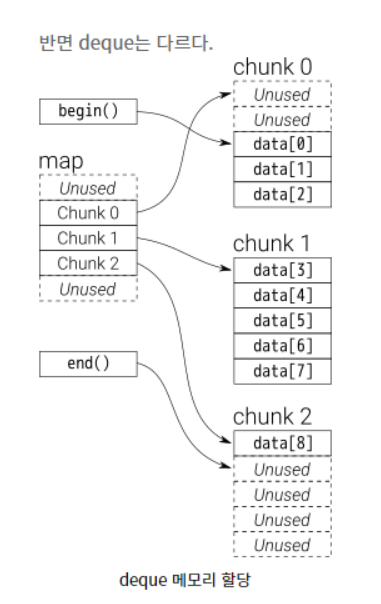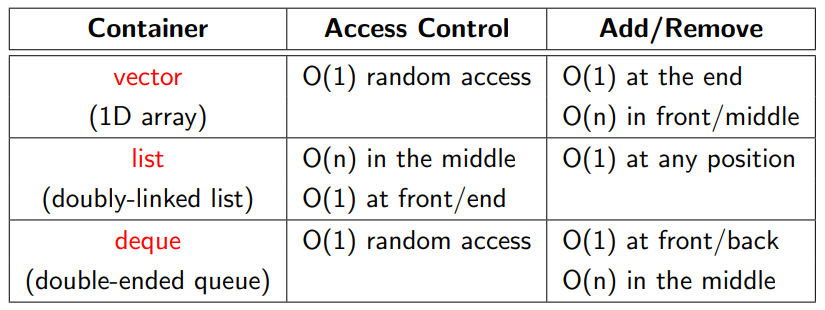(C++) Standard Template Library (STL) for Generic Programming
All of the Leetcode algorithm questions I recently solved involved vectors. When I learned C++ and OOP in school, we dealt with arrays most of the time. Since I’m not really used to vectors, I decided to self-study this topic and realized that vector is one of the types of STL. Therefore, I’m going to summarize the self-study note about STL that was provided in COMP 2012 (OOP) class.
The Standard Template Library (STL) is a collection of powerful, template-based, reusable codes.
It implements many general-purpose containers (data structures) together with algorithms.
To use STL, we need an understanding of the following 3 topics:
- containers
- iterators
- algorithms
STL containers
A container class is a class that holds a collection of homogeneous objects.
The object types need not be known when the container class is designed.
Containers in STL:
Sequencecontainers- Represent sequential data structures
- Start from index/location 0
- e.g. vector, list, deque
Associativecontainers- Non-sequential containers
- Store (key, value) pairs
- e.g. map, multimap, set, multiset
Container adaptors- adapted containers that support a limited set of container operations
- e.g. priority-queue, queue, stack
Near-containers- Exhibit capabilities similar to those of the sequence containers, but do not support all their capabilities.
- e.g. string
Sequence containers
Deque (double-ended queue)
- Unlike STL vector, its elements are not stored contiguously; it uses a sequence of chunks of fixed-size arrays.
- Like STL vector, its storage is automatically expanded or contracted as needed.
- Unlike queue, allows fast insertion and deletion at both ends.


Properties of sequence containers

Methods of deque
Element access for all:
front(): first elementback(): last element
Element access for vector and deque:
[]: subscript operator, index not checked.
Add/remove elements for all:
push_back(): append element.pop_back(): remove last element.
Add/remove elements for list and deque:
push_front(): insert element at the front.pop_front(): remove first element.
insert(p, x): insert an element x at position p.
erase(p): remove an element at position p.
clear(): erase all elements.
size(): return the number of elements.
empty(): return true if the sequence is empty.
resize(int new_size): change size of the sequence (by assigning new memory space).
Container adaptors
Stack
Stack follows last-in first-out (LIFO) policy.
Major operations:
top(): get the value of the top item.push(): add a new item to the top.pop(): remove an item from the top.empty()
Example codes
#include <iostream>
#include <stack>
using namespace std;
int main()
{
// 1. Convert +ve decimal number to binary number using a stack
stack<int> a;
int x, number;
while (cin >> number) {
x=number;
do {a.push(x%2); x/=2;} while (x>0);
while (!a.empty()) {cout << a.top(); a.pop();}
}
return 0;
Algorithm to check balanced parenthesis
- Scan the given character expression from left to right.
- If a left parenthesis is read, push it onto a stack
- If a right parenthesis is read, check if its matching left parenthesis is on the top of the stack.
- If step 3 is true, pop the stack and continue.
- If step 3 is false, return false and stop.
- If the end of the expression is reached, check if the stack is empty.
- If step 6 is true, return true otherwise false.
Queue
Queue follows first-in first-out (FIFO) policy.
Major operations:
front(): get the value of the front item.enqueue(): add a new item to the back.dequeue(): remove an item from the front.empty(),size(),back(),push(),pop()
STL iterators: Generalized pointers
Iterators are generalized pointers. It helps us to traverse the elements of a sequence container sequentially.
STL sequence containers provide the begin() and end() to set an iterator to the beginning and end of a container.
For each kind of STL sequence container, there is an iterator type.
Iterators allow us to separate algorithms from containers when they are used with templates.
STL algorithms
STL also has algorithms that work with different containers. STL algorithms are implemented as global functions.
e.g. find(Iterator first, Iterator last, const T& value)
find_if(Iterator first, Iterator last, bool predicate): iterator stops when a condition is satisfied.
The condition is called a predicate and is implemented by a boolean function.
Function pointer
C++ allows a function to be passed as argument to another function. We call this as passing the function pointer.
Examples
int larger(int x, int y) {return (x>y) ? x : y;}
int smaller(int x, int y) {return (x<y) ? x : y;}
int main() {
int choice;
cin >> choice;
// choice==1 for larger function; other for smaller function
int (*f) (int, int) = (choice == 1) ? larger : smaller;
cout << f(3, 5) << endl;
return 0;
}
// 2. Array of function pointers
// four functions: add, subtract, multiply, divide
int main()
{
// Array of function pointers
double (*f[]) (double x, double y) = { add, subtract, multiply, divide };
int operation; double x, y;
while (cin >> operation >> x >> y) {
if (operation >= 0 && operation <= 3) { cout << f[operation](x, y); }
}
return 0;
}
Leave a comment